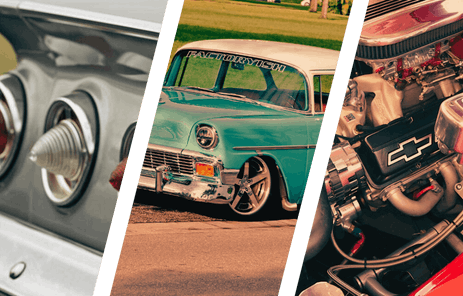When Chevrolet began making the Chevy II Nova wagons, there wasn’t much wicked about them. The mission of the early Novas was to give car buyers a simple, back-to-basics compact car. Especially when it came to the station wagon version. The thought process from the factory was, “maximum function with thrift.”
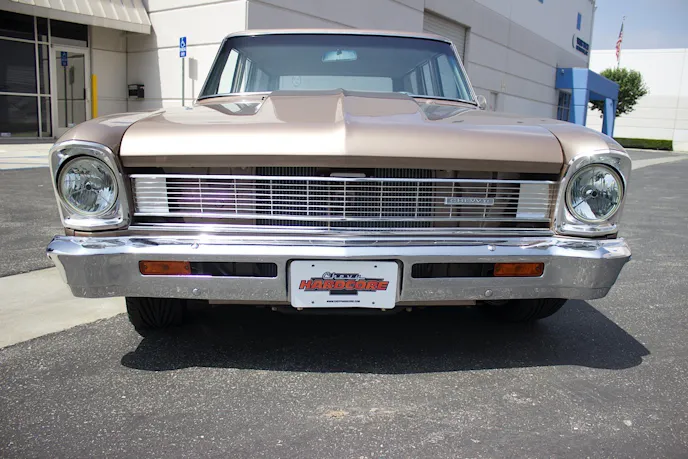
Christian and Marlene Morrow’s ’66 Nova Wagon became something more than basic. Car owner and builder Christian claims that the car represents something that began as a thrifty buy that turned into a classy daily driver. A conflict of terms that is similar to the conflicting natures of good and evil, except that the battle played out in an automobile. A wicked wagon and when you see the long roof heading your way, it’s clear that something wicked this way comes.
We Came. We Saw.
We spotted Morrow’s novel Nova at TCI Engineering’s SoCal Nova BBQ on Saturday, June 7, 2014. They don’t make ‘em like this anymore and they never did, which is what makes this wagon stand out. Christian Morrow had a vision and produced this amoral auto with his own hands. Almost every aspect was done single-handedly, from the engine building to the paint job.

Project Wicked started out as a mischievous idea; taking an unloved station wagon and making a unique show car lovingly crafted by a single pair of hands. Morrow plunked down $700 for the dilapidated grocery getter in 1996 after finding this hidden prize in the local classified ads. He had the Chevy II towed to his driveway where everyone else was shocked, including his then girlfriend and future wife, Marlene. Christian’s vision for the wagon drove his passion and he worked feverishly getting the car whipped into shape.
The Vision
Christian’s game plan from the beginning of the project was to do most of the work himself while keeping a clean, sleek theme on the car. Doing all the work himself allowed Christian to have full control over all of the details, which worked well with his keen eye.
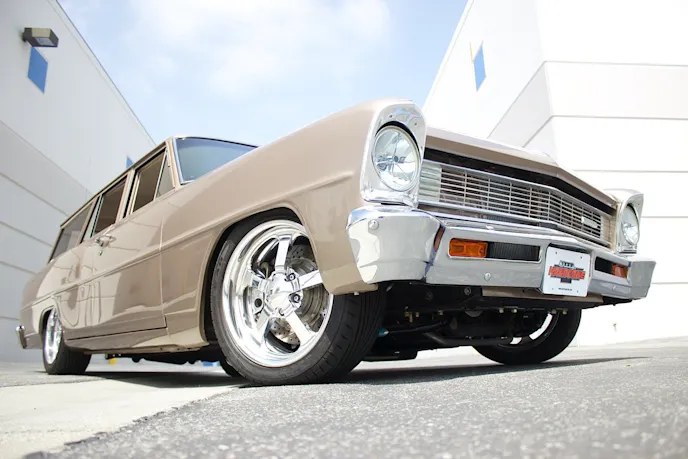
He started by stripping the body down to bare metal allowing him to evaluate the condition of the sheet metal. After replacing the right rear quarter-panel and a few other sheet metal parts, Christian began with some body modifications. Getting rid of most of the badging, he also shaved the rear door handles and side trim.
Gaining momentum, he worked on the car every morning before work and many evenings after work. The wagon began to fall into place as he fabricated and welded a custom dash. He fabricated a custom gas-filler door, repaired the cargo floor and welded up all of the holes in the sheet metal from the body trim that he had removed. After adding a cowl-induction hood, he hung all the panels and parts, then sprayed the car with PPG 2-stage light Autumnwood metallic paint.

In 1998 Christian married his understanding girlfriend Marlene and by marriage she inherited the wagon project as part of the family commitment. While she didn’t see the same vision that drove her husband, Marlene accepted his need to complete the build.
He began working on the project at nights in his garage for the next six-months. He kept true to his original plan of doing most of the work himself including the engine build, wiring, interior, suspension, body work and painting.
The Wicked
We don’t know exactly where Christian came up with the name “wicked” for this project but we can reasonably assume that wicked refers to the battle between good and evil. The traditional battle that involves sin and temptation. Like every good tale, this one ends with good prevailing in the end. In this case, good didn’t win with supernatural or physical powers, but by purity of heart. With that we are speaking directly of the engine build.
In a time where LS swaps have become the norm and not the exception, Christian has built and kept a traditional small block Chevy musclecar engine under the hood. Morrow’s 400 SBC has been bored out to 0.030 over making it a traditional 406cid. An Isky solid-lifter camshaft kit is the bumpstick of choice with a classic mechanical secondary Quick Fuel 750-cfm carb providing the fuel delivery. An Edelbrock Victor Jr. intake manifold sits on top of the mill while a set of 131/44-inch Hooker Super Comp headers directs exhaust though a pair of two-chambered Flowmaster mufflers.
The crankshaft is a SCAT SBC400 factory crank supported by four-bolt splayed Milodon main caps. Eagle 5.7-inch connecting rods with dished SRP pistons fitted with moly rings bring the compression down to a streetable 10:1.
Morrow used Chevy Bow Tie 202 angle-plug, 64cc ported and polished cylinder heads with 202 valves to cap off the block. Isky 1.5 ratio roller rocker arm under sheetmetal valve covers complete the build and an MSD 6AL ignition system provides the spark. This combination hit the dyno at 500hp and has classic wicked written all over it.
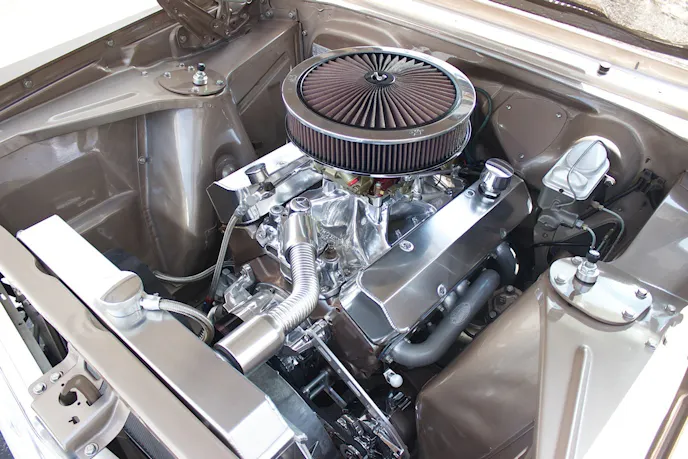
The engine’s cooling system consists of a Meziere electric water pump, Perma-Cool electric fan and a Howe aluminum radiator. A setup that works well in the stupidly hot southern California summers.

Drivetrain and Suspension
A Turbo Hydromatic 350 automatic transmission mounts behind the engine. The slushbox has been modified with a B&M shift kit supported with a B&M torque converter. A stock driveshaft transmits the power to a Chrysler 831/44 differential. While searching for one of these old reliable rearends, Morrow found one in the Recycler that already had Nova-spaced spring perches welded on. Stuffed with 3.23 posi equipped gears turning 30-spline axles, he bolted the reared into his chassis with little modification needed.
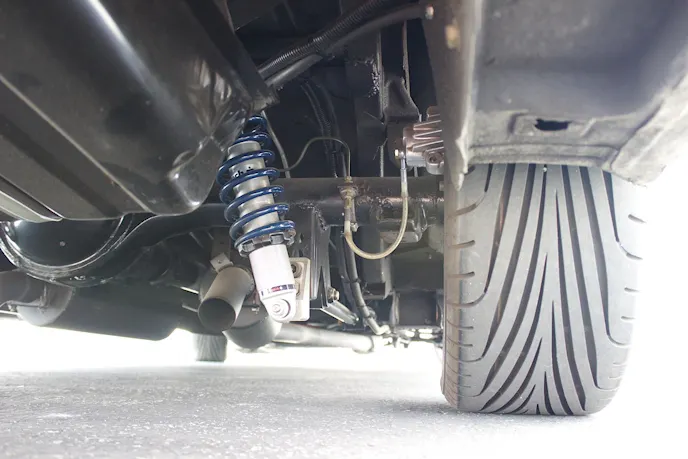
The Nova sits on RideTech coilovers which allow Morrow to dial in his ride height. He has stiffened up the unibody chassis with weld-in sub frame connectors. The front end sports a 1-inch anti-roll bar and stock steering system with tubular Classic Performance Products A-arms to add stability and control. The crown jewel in the suspension system is the owner designed and fabricated four-link rear suspension. Starting with an Air Ride Technologies four-link kit, Morrow shortened the bars and fabricated his own brackets for the installation.

Interior
Morrow kept the stock original bench seats, but decided to customize the upholstery to match the rest of the car. With wife Marlene, he selected a light tan tweed design for the interior. A tweed headliner was installed along with the light tan tweed seat covers. Tweed door panels soon followed and the interior was capped off with a Corvette tan carpet.
Morrow custom fabricated a new dash fitted with white-face Auto Meter gauges. In addition to a speedometer and tachometer, he added fuel, water temperature, and oil pressure gauges. The steering wheel is a Budnik Tusk II and the transmission is operated by a B&M Star Shifter.
Lastly, for pure entertainment, Morrow added a Kenwood CD player to define what wicked was all about.
Owner: Christian & Marlene Morrow
Hometown: Mission Viejo
Car: 1966 Chevy Nova Wagon “Wicked”
Paint: PPG 2-Stage Light Autumnwood Metallic, sprayed by owner
Body Mods: Shaved rear door handles and side trim, Side and rear custom-made bronze glass, custom gas filler door and cowl induction hood.
Interior: Light tan tweed headliner and seat covers. Tweed door panels. Corvette-tan carpet. Budnik Tusk II steering wheel. B&M Star shifter.
Engine and Transmission: 406ci SBC / 350 Turbo Hydromatic
Underhood Parts: Hooker Headers, Flowmater mufflers. Quick Fuel 750cfm carb with mechanical secondaries. Edelbrock Victor Jr. intake manifold.
Brakes: Baer calipers with 13-inch disc, drilled and slotted with anodized hats on all four corners.
Rims and Tires: 17X7 Budnik Tiller 5 forged billet aluminum wheels. Goodyear F1 215/45-17 front tires, 225/50-17 Goodyear F1 rear tires
Enjoy this gallery of Morrow’s Wicked Wagon (Click on an image to enlarge):
You might also like
Power Adders: Nitrous, Blowers, And Turbos For Serious Power
Power adders come in all shapes and sizes. Here’s a clear breakdown to help you choose the right setup for your project.











